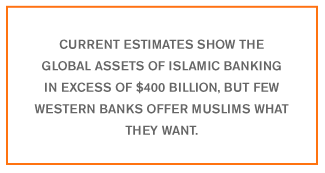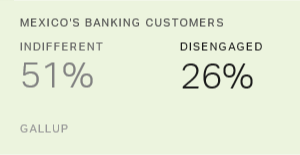There are sufficient Muslim investors and borrowers in Islamic and non-Islamic countries to warrant the attention of traditional banks that seek to serve such clients and capture a potentially profitable slice of the market. The challenge for Western banks, however, is to leverage their banking knowledge and expertise while fulfilling the requirements of their Islamic customer base and complying with Islamic banking principles. It's not easy, but for big banks, or any bank serving a large Muslim population, it can be worth it.
 |
Key Islamic financial instruments
Islam is not only concerned with the relationship between humans and Allah. It is also a system of beliefs and values that underpin the entire Islamic way of life -- including financial services. These beliefs are governed by the body of Islamic principles generally referred to as Sharia, and those principles are applied, among many other things, to the development and creation of Islamic financial products.
The main principles of Sharia-compliant banking are as follows:
- The charging of interest, or riba, is strictly prohibited. It is deemed unfair exploitation.
- Sharia does not permit speculation or gambling. Thus, derivative transactions, such as swaps, futures, and options, are difficult to enter.
- Investments in certain products, such as alcohol, pork, and gambling activities, are prohibited.
- Profit cannot be ensured. What's more, the Islamic financial institution must assume at least part of the investment risk, so a guaranteed return is not applicable in Islamic finance.
- There is no concept of uncertainty. Uncertain investment returns are not permitted.
Islamic financial institutions raise money primarily through their main banking services (product offerings, funding accounts, and investments), which are Sharia compliant, such as current or checking accounts and non-interest-bearing savings accounts. But there are several other forms of bank profitability permitted by Sharia:
- Mudaraba (trust financing): This is a form of partnership in which one partner (the bank) provides the capital required for funding a project, while the other party (the customer/business owner) manages the investments using his expertise.
- Ijara (leasing): Ijara, which is very similar to a conventional lease, is a contract under which the bank buys and leases out an asset for a rental fee. This practice is commonly used for Islamic mortgages. The ijara contract can be paid back at any time by paying the full purchase price to the bank; once the bank has been paid, the rental payment ceases, and the asset passes from the bank to the owner.
- Salam (advance purchase): Defined as forward purchase of specified goods for full forward payment, this contract is regularly used for financing agricultural production.
- Murabahah (cost-plus financing): This technique is used extensively to facilitate the trade finance activities of Islamic financial institutions. The bank will purchase the necessary goods, then resell them to its clients at cost plus a reasonable profit. The bank will agree up front with its clients on the margin of profit to be added to the cost.
- Sukuk (bond issue): This essentially amounts to commercial paper that provides the subscribers with ownership in the underlying assets.
There are various types of Islamic finance, and all present variations, limitations, and potential obstacles of one kind or another to banks:
- Borrowers usually provide a larger than average mortgage deposit.
- Islamic mortgages are more expensive to the borrowers than conventional ones.
- Monthly payments are high in murabahah instruments but volatile in ijara instruments.
- Each transaction can be complex and difficult to convey to potential users, as combinations of contracts are often involved in a single transaction.
- There is a possibility for "negative equity" in the ijara mortgage.
- There is an absent or underdeveloped international capital market. Most capital markets are not Sharia compliant, which means there is not a sufficient critical mass of transactions carried out under Sharia to sustain a market.
- There's no market-maker mechanism as in the conventional market that enables buyers and sellers to interact and carry out transactions.
Customer segmentation in retail Islamic banking
Developing Sharia-compliant retail financial products can be complex, with a multitude of options available under different regulations and consumer requirements. Before embarking on such a route, banks must carefully identify the target customer base for the product and possess a deep understanding of its needs and priorities. Much like Western banking, where there is no "one-size-fits-all" approach to product development, Islamic banking has an array of customer segments, each with different product, service, and brand criteria. The better the bank knows its Muslim market, the more profitable its Islamic banking services will be.
 |
The first thing to understand is that Sharia isn't carved in stone. Customers will interpret acceptable levels of Sharia compliance differently. More traditional and conservative customers will be willing to pay a premium for the most Sharia-compliant products. Other customers, however, may be more attracted to products that are less rigidly Sharia compliant but that offer a more competitive rate. Prior to designing Sharia-compliant product concepts, features, and benefits, banks need to understand the requirements of the target customer segment and weigh the resulting costs and benefits.
Service requirements also differ between customer segments. As with any bank customer, age, education, lifestyle, and desired relationship determine service offering. Rather than offering one-size-fits-all products, delivering Sharia-compliant products to various customer segments can be a bank's best differentiator.
Branding also can be a strong differentiator among prospective customers. Certain customer segments will only bank with brands that have a strong history and presence in Islamic countries, whereas other customer segments will be more willing to accept Western brands with the right product and service propositions.
As with any new product development, banks must seek to understand Muslim customer segments; define their product, service, and brand criteria; and assess the economic, technical, and regulatory feasibility of marketing to prospective customers. It's what banks do every day because that's what creates the compelling propositions that provide returns.
Not easy, but worth it
In 2005, Lloyds TSB in the United Kingdom added Sharia-compliant banking products to its retail services. It was a smart idea because the Islamic bank market is flourishing. Current estimates show the global assets of Islamic banking in excess of $400 billion, but few Western banks offer Muslims what they want.
Unfortunately, Lloyds TSB was merely rebranding some of its existing limited product range. Thus, its Sharia-compliant banking wasn't terribly competitive -- not when compared to conventional retail banking offerings in the United Kingdom. Nonetheless, this was the first major offering from a Western bank for Muslims in the United Kingdom, and it has encouraged other banks to evaluate this strategy.
Considerable demand exists for Islamic banking products -- both in Islamic countries and in the West. This need has gone largely unfilled for a number of reasons, including risk aversion and ignorance of the market. Unless Western financial service providers embrace Sharia banking practices, Muslims will be forced to bank with niche or specialist financial institutions, thus limiting the availability of varied financial products to a large proportion of the Islamic world. This would leave a tremendous amount of money on the table.
The U.K. government is among the first in the West to change its laws to embrace Islamic banking. For instance, it has recently abolished double-stamped duties, which until now were for people purchasing property under Islamic principles. The government is reviewing other laws to ease the establishment and offerings of Islamic banking products. Naturally, this has opened the doors for Western banks to further their interests in this market.
But as the market for Islamic banking grows, there is an imperative need for banking infrastructure to grow too. Banks competing in the Muslim market need IT systems that can accommodate and provision an innovative product mix -- and also provide cost-effective pricing. There is no universal IT system for Islamic banks, so Sharia-compliant banks have developed custom systems that limit their product development capabilities.
A Western bank using an effective IT system and offering Sharia-compliant products will have a key competitive advantage -- not the least of which is being one of the first in the market. Without doubt, that will help the bank make great inroads into the prosperous and growing Muslim market.
Yes, Islamic principles can be a massive burden on Western banks. But the potential return from a market that is $400 billion and growing can outweigh the financial investments and commitment.

